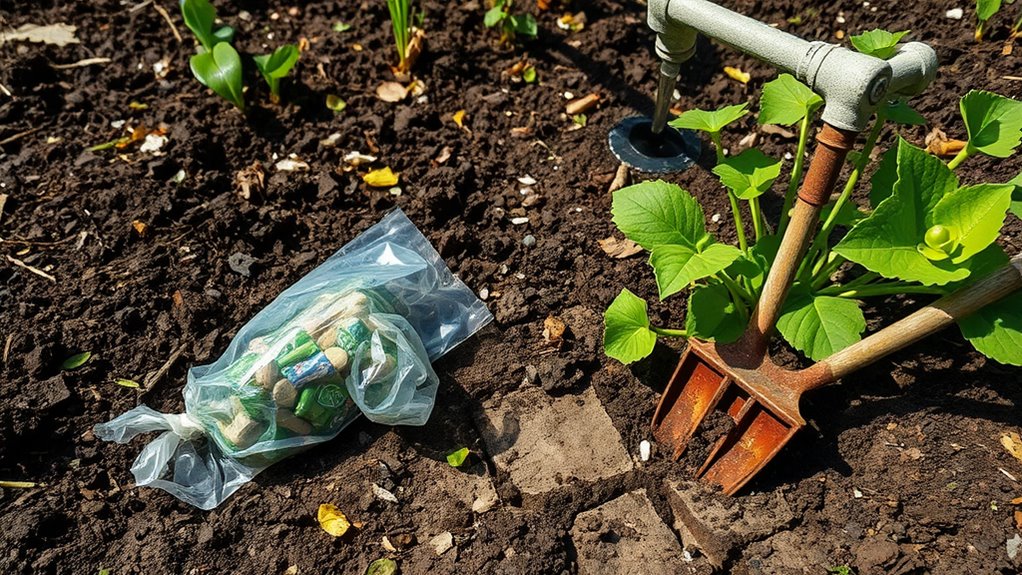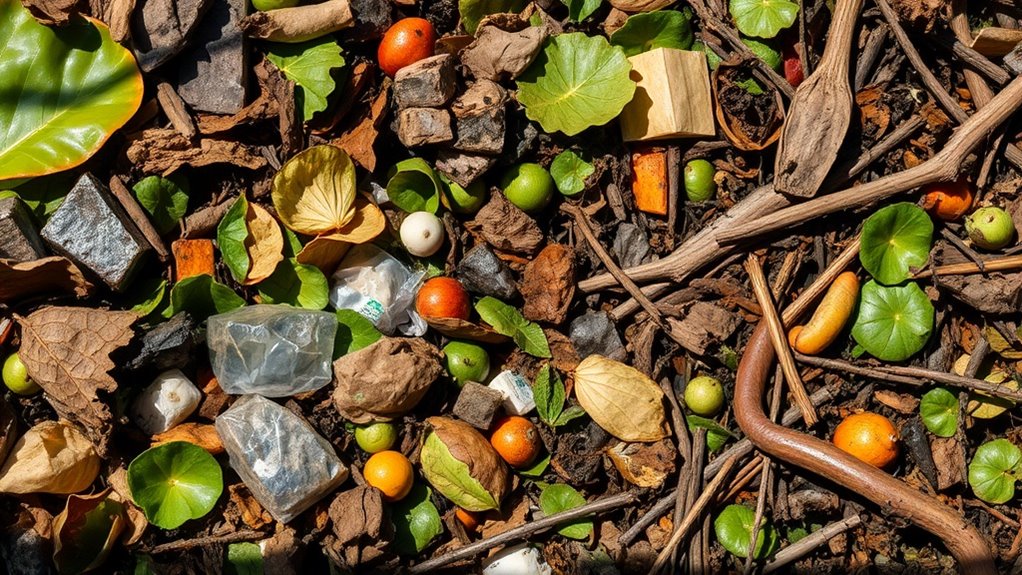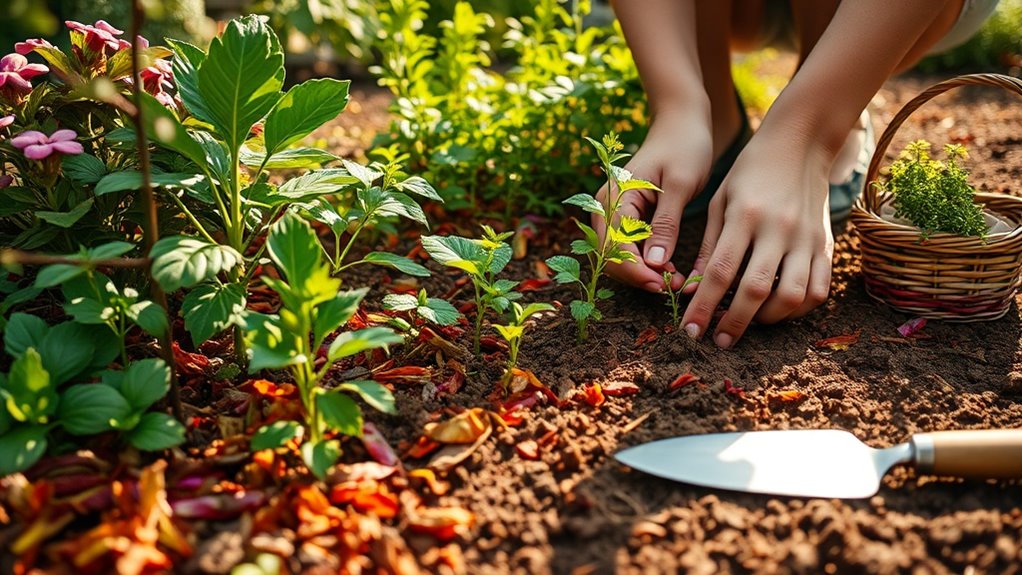5 Things You’re Doing That Ruin Your Soil Quality
You’re overusing chemical fertilizers, neglecting soil aeration, ignoring crop rotation, allowing soil erosion, and disregarding organic matter. Each action impacts soil quality in significant ways. The consequences of these practices are often overlooked, leading to long-term degradation of soil health. Understanding the effects of these habits is crucial for sustainable farming. So, what can you do to reverse the damage and improve your soil’s vitality?
Key Takeaways
- Overusing chemical fertilizers disrupts soil balance, depletes microorganisms, and leads to long-term fertility issues.
- Neglecting soil aeration restricts oxygen flow, hindering root respiration and microbial activity essential for nutrient cycling.
- Ignoring crop rotation depletes specific nutrients, reduces yields, and increases pest susceptibility by creating favorable environments for pests and diseases.
- Allowing soil erosion strips nutrient-rich topsoil, decreases fertility, and harms plant growth by increasing water runoff and sedimentation.
- Disregarding organic matter addition compromises soil structure, reduces nutrient retention, and limits biodiversity, affecting overall soil health.
Overusing Chemical Fertilizers
How does the overuse of chemical fertilizers impact soil quality?
When you excessively apply these fertilizers, you disrupt the natural nutrient balance, leading to soil damage habits that degrade its structure.
High concentrations of nitrogen, phosphorus, and potassium can cause nutrient runoff, harming nearby water bodies while depleting essential soil microorganisms.
This imbalance reduces organic matter, impairs water retention, and increases soil acidity, making it less fertile over time.
Moreover, your reliance on chemicals can lead to a cycle of dependency, where the soil’s natural fertility diminishes, necessitating even more fertilizers.
Ultimately, this practice compromises long-term soil health. Improving soil quality requires a shift towards more sustainable practices that enhance, rather than degrade, the soil ecosystem.
Neglecting Soil Aeration
Why is soil aeration often overlooked in gardening and farming practices?
Many assume that healthy plants require only water and nutrients, neglecting that soil structure plays a crucial role.
Compacted soil restricts oxygen flow, limiting root respiration and microbial activity essential for nutrient cycling.
When you ignore aeration, you hinder water infiltration and exacerbate erosion.
Techniques such as tilling, using aerators, or regularly rotating crops can improve soil porosity.
By prioritizing aeration, you enhance soil health, boost plant vitality, and ultimately increase crop yields.
Don’t underestimate the importance of this often-ignored aspect of soil management; it’s vital for sustainable agriculture. Signs of struggling garden soil can also indicate the need for improved aeration practices.
Ignoring Crop Rotation
What happens when you ignore crop rotation in your gardening or farming practices?
You risk depleting soil nutrients, leading to reduced crop yields and increased pest and disease susceptibility.
-
Nutrient depletion occurs as specific crops exhaust particular nutrients over time.
-
Soil structure deteriorates, making it harder for roots to penetrate and absorb water.
-
Pests and diseases proliferate when the same crops are grown repeatedly, creating a favorable environment for their survival.
To maintain soil quality, diversify your crops annually. Incorporating natural materials for soil health can further support nutrient replenishment and enhance overall fertility.
Embracing crop rotation not only enhances soil health but also promotes sustainable agricultural practices.
Allowing Soil Erosion
Soil erosion can significantly compromise the health of your land, leading to a cascade of detrimental effects.
When you allow erosion to persist, you strip away nutrient-rich topsoil, decreasing soil fertility and disrupting plant growth.
Water runoff increases, causing sedimentation in nearby waterways, which harms aquatic ecosystems.
Additionally, you may face decreased water retention in your soil, making it harder for crops to thrive during dry spells.
To combat erosion, implement measures like cover cropping or creating terraces. Incorporating natural tricks for healthier soil can further enhance soil quality and resilience against erosion.
Disregarding Organic Matter Addition
While you may focus on other aspects of land management, disregarding the addition of organic matter can severely undermine soil quality.
Organic matter enhances soil structure, facilitates nutrient retention, and improves microbial activity.
By neglecting it, you risk:
- Decreased soil fertility due to nutrient leaching
- Reduced water retention, leading to drought stress
- Compromised biodiversity, limiting beneficial organisms
Incorporating organic matter, such as compost or cover crops, is essential for maintaining a healthy soil ecosystem. Using homemade fertilizer from kitchen scraps can be an effective way to enrich your soil with organic nutrients.
Regularly assessing and amending soil with organic materials can significantly enhance its quality, ensuring sustainable agricultural productivity and environmental health.
Don’t overlook this critical component.





